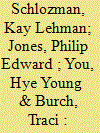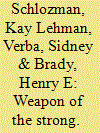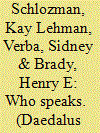|
|
|
Sort Order |
|
|
|
Items / Page
|
|
|
|
|
|
|
| Srl | Item |
| 1 |
ID:
142737


|
|
|
|
|
| Summary/Abstract |
This article documents the prevalence in organized interest politics in the United States of organizations—for example, corporations, think tanks, universities, or hospitals—that have no members in the ordinary sense and analyzes the consequences of that dominance for the democratic representation of citizen interests. We use data from the Washington Representatives Study, a longitudinal data base containing more than 33,000 organizations active in national politics in 1981, 1991, 2001, 2006, and 2011. The share of membership associations active in Washington has eroded over time until, in 2011, barely a quarter of the more than 14,000 organizations active in Washington in 2011 were membership associations, and less than half of those were membership association with individuals as members. In contrast, a majority of the politically involved organizations were memberless organizations, of which nearly two-thirds were corporations. The dominance of memberless organizations in pressure politics raises important questions about democratic representation. Studies of political representation by interest groups raise several concerns about democratic inequalities: the extent to which representation of interests by groups is unequal, the extent to which groups fail to represent their members equally, and the extent to which group members are unable to control their leaders. All of the dilemmas that arise when membership associations advocate in politics become even more intractable when organizations do not have members.
|
|
|
|
|
|
|
|
|
|
|
|
|
|
|
|
| 2 |
ID:
097629


|
|
|
|
|
| Publication |
2010.
|
| Summary/Abstract |
What is the impact of the possibility of political participation on the Internet on long-standing patterns of participatory inequality in American politics? An August 2008 representative survey of Americans conducted by the Pew Internet and American Life Project provides little evidence that there has been any change in the extent to which political participation is stratified by socio-economic status, but it suggests that the web has ameliorated the well-known participatory deficit among those who have just joined the electorate. Even when only that subset of the population with Internet access is considered, participatory acts such as contributing to candidates, contacting officials, signing a political petition, or communicating with political groups are as stratified socio-economically when done on the web as when done offline. The story is different for stratification by age where historically younger people have been less engaged than older people in most forms of political participation. Young adults are much more likely than their elders to be comfortable with electronic technologies and to use the Internet, but among Internet users, the young are not especially politically active. How these trends play out in the future depends on what happens to the current Web-savvy younger generation and the cohorts that follow and on the rapidly developing political capacities of the Web. Stay logged on …
|
|
|
|
|
|
|
|
|
|
|
|
|
|
|
|
| 3 |
ID:
108869


|
|
|
|
|
| Publication |
2011.
|
| Summary/Abstract |
Using an August 2008 representative survey of Americans conducted by the Pew Internet & American Life Project, we investigate the consequences of Internet-based political activity for long-standing patterns of participatory inequality. There is little evidence of change in the extent to which political participation is stratified by socioeconomic status, even when we account for the fact that the well educated and affluent are more likely to be Internet users. However, because young adults are much more likely than their elders to be comfortable with electronic technologies and to use the Internet, the Web has ameliorated the well-known participatory deficit among those who have recently joined the electorate. Still, among Internet users, the young are not especially politically active. How these trends play out in the future depends on what happens to the current Web-savvy younger generation and the cohorts that follow as well as on the rapidly developing political capacities of the Web.
|
|
|
|
|
|
|
|
|
|
|
|
|
|
|
|
|
|
|
|
|